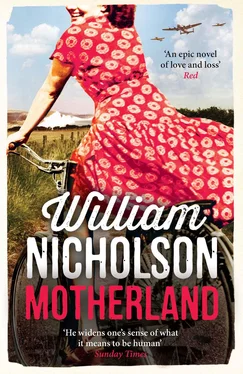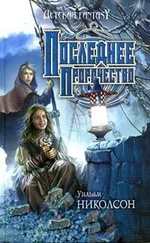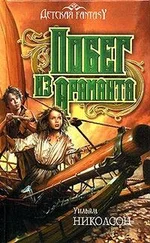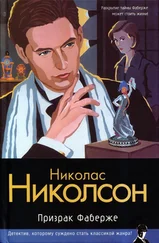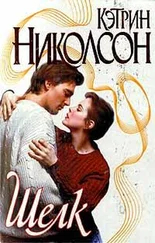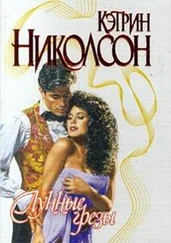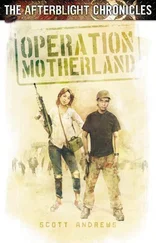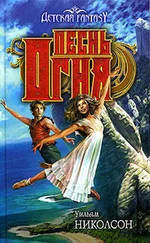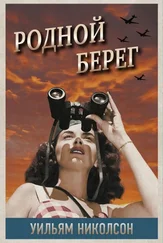She puts a small pan of porridge on the hob, wishing she’d remembered to set the oats to soak last night. The kettle boils. She scoops a spoon of tea leaves into the pot, and adds the steaming hot water. There’s milk in the cold safe in the larder, put aside for her exclusive consumption, because she’s a nursing mother.
By the time the porridge is cooked, and she’s eating it sweetened with a precious spoonful of pre-war home-made blackberry jam, she can hear her mother rising in her bedroom overhead. The water pipes gurgle as she runs the taps. Soon now she’ll be down, and Kitty’s time of quiet will be over.
Kitty misses her life in the service. She misses driving. She would almost say she misses the war, since here in this ancient little town nothing seems to have changed, except for the food shortages. The main roads still pass to the east or west of the town, and the canals and railways miss it altogether.
It’s not been easy being home again. Once her pregnancy was confirmed, and the news came through that Ed was a prisoner of war, she understood that her life was to change. Her job now is to raise little Pamela, and wait for the end of the war to bring Ed home. Then they can have their own house together, the three of them, and she won’t have to be grateful to her mother any more.
A little later Mrs Teale comes down and joins her in the kitchen, and the stream of well-meaning anxious chatter begins.
‘How are you this morning, darling? I heard Pamela grizzling in the night and I almost got up to tell you to make sure to lie her on her tummy or she won’t sleep. I see you’ve not had the last of the bread which I left specially for you. It’ll be good for nobody by tomorrow. Such a beautiful morning, really you could almost put Pamela outside in the pram now, fresh air makes such a difference when they’re tiny. Harold used to love it so, he cried when I brought him back inside.’
There’s been no word of Harold for several weeks now. This awareness floats briefly past Mrs Teale’s eyes, causing her to look to one side and wince as if stung.
‘You were so different, you didn’t like being in your pram at all, I never could work out why,’ she resumes. ‘Sometimes I wonder where they all come from, the ideas you get. I still have no idea why you refused the Reynolds boy, I should have thought he was perfect for you, and he adored you. Of course, he is in the church, and you’re set against that, though I can’t imagine why, you sing so beautifully in the abbey choir, and Robert Reynolds is just the kind to do well, everyone says so. You ask your father.’
‘Mummy, I’m married.’
‘Yes, darling, of course you are.’ Though truth to tell, Mrs Teale has temporarily forgotten this fact. Kitty’s husband has made such a fleeting appearance in their lives, and who knows what new sorrows this terrible war will bring before it’s over? ‘Robert Reynolds hasn’t married yet, as it happens, which many people find very strange, but I always did think he was such a serious boy, not the kind to chop and change once his mind is made up.’
‘I hope you don’t mean his mind is made up to marry me.’
‘No, of course not, though as it happens I’m not perfectly sure he knows that you’re married. After all, the wedding wasn’t really done in the way people might have expected, was it? I mean, not from home and in the Abbey as would have been so natural, and all in such a rush, so that there was no time to tell people, and Harold not there, and Michael so disappointed not to be asked to conduct the service.’
‘Daddy didn’t mind a rap. You know that very well.’
‘He tells you that so as not to hurt your feelings, but of course he minded, it’s only natural.’
Kitty gets up from the table.
‘I’d better go and see to Pammy.’
As usual her mother has managed to put her out of temper. She meets her father in the hall as he comes downstairs, dressed for the day in clerical suit and dog collar. His round pink face lights up as he sees her.
‘Kitty, my dear!’ he says, embracing her. ‘You have no idea how the sight of you lifts my spirits each morning.’
‘You didn’t mind not doing our wedding, did you, Daddy?’
‘Not one bit. Why would I mind? I spend my life doing weddings. It was pure pleasure to have nothing to do but admire you.’
A rustling in the letterbox announces that the paperboy has delivered the morning Times . Michael Teale draws it out of the wire basket and points it unopened at Kitty.
‘You give that beautiful child of yours a kiss from her grandpa.’
He goes on into the kitchen. When Kitty is halfway up the stairs she comes to a stop. Her father is speaking to her mother in a cold clear voice.
‘I told you never to tell Kitty I minded about her wedding.’
‘But Michael …’ Her mother’s voice wheedling, placatory.
‘You’re a fool. What are you?’
‘A fool, Michael.’
Kitty continues up the stairs, not wanting to hear, not wanting to feel. Little Pamela senses her coming into the room and is lying awake, big eyes gazing up at her from her cot.
‘Did you have a lovely sleep, sweetheart? Would you like to have a nice clean nappy? Then we’ll go out for a walk by the river and see the swans.’
Mrs Teale, though in many respects a fool, has undeniable skills when it comes to household management in wartime. As soon as she knew of Kitty’s pregnancy she set about preparing for the baby. In this way, when Kitty arrived in the house in Malmesbury, heavily pregnant, she was presented with four cotton baby gowns, four vests, three matinée jackets, three pairs of knitted woollen bootees, and two knitted shawls. Most magnificently of all her mother had tracked down a reconditioned prewar Marmet perambulator, for which her father paid £10.
This is the pram in which Kitty takes her baby out for walks along the River Avon; attracting as she goes admiring and envious glances from other young mothers. There are large concrete blocks all along the river bank to stop tanks, which people say are there to defend the secret factory at Cowbridge. No one knows what goes on at Cowbridge. The rumour is that rich people pay to send their sons there so they can get out of being called up.
Kitty no longer believes in the war. She never says so, that would be defeatism, but all she wants is for it to be over and Ed to come home. It’s gone on too long and she no longer feels part of it. The world has become tired. She wants to start all over again.
The hardest part is that she’s finding she can’t remember Ed. Their time together was so brief. She remembers the feeling of him, the intense excitement she felt when he was with her; but his face has become hazy, little more than an expression, which is itself little more than a feeling. The way he looked at her, smiling with his mouth but not his eyes. That sense that he was always out of reach. She has his photograph, of course, but she has gazed at it for too long, and her gaze has drained it of life. His photograph no longer looks back at her.
She wheels the pram down the river path, and returns up the High Street. The queue outside Mallards is shorter than usual so she joins it, and smiles as the other women coo over her baby. One woman gives Kitty a shy smile and says, ‘I was told your husband got the VC.’
‘Yes,’ says Kitty.
‘You must be so proud.’
‘Yes, I am.’
It’s almost her turn now. She takes out her ration book and the baby’s ration book.
‘You make sure you get your share,’ says the woman to little Pamela. ‘Your dad’s a hero.’
As Kitty arrives home again her mother is looking out for her.
‘You’ve got a visitor,’ she says.
Kitty gathers Pamela up from the pram, letting her mother take the shopping and the pram itself, which lives in the shed down the side path.
Читать дальше
